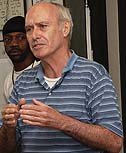Michael Stoops says he hasn't spoken at a conference in Mississippi since Ray Mabus was governor, but this Friday, he'll be back behind the lectern, giving the keynote address at this year's Mississippi Annual State Conference on Homelessness at the Eagle Ridge Conference Center in Raymond. Stoops is acting executive director of the National Coalition for the Homeless.
What do you plan to address?
I'll be giving an overview of some of the national trends in homelessness. One of the fastest-growing segments among the homeless are what we could call the working homeless. These are people who are working full time, but they don't have good enough jobs to work themselves out of homelessness.
Another trend is that we're seeing an increase in elderly homeless people. Just as the general population is graying, so are the homeless. More shelters are now housing elderly homeless people. It's very sad.
How many children are homeless?
When I tell people this, they're shocked, but national studies show that 25 percent of the homeless are children. I never thought we would get to the point where we would allow so many children to be homeless in America.
How many are homeless nationally?
There are about 800,000 on any given night, and 3.5 million people are homeless for a time every year.
What's our best hope for a reduction?
Homelessness is really a housing issue. The federal housing budget has been cut dramatically over the years. In 1979, the HUD budget was about $83 billion. Today, the federal housing budget is about $30 billion.
How has low-income housing faired under the Republicans?
When it comes to the federal homelessness budget, Congress and the president have increased spending, but at the same time, they've made cuts in Medicaid, food stamps (and) low-income energy assistance. We have an administration that talks about ending homelessness … then they cut important entitlement programs, and that causes more people to be homeless. We want the cut-backs restored. We want an increase in money.
What do you think of our City Council passing a panhandling ordinance?
Those measures are doomed to fail.
Why?
Criminalizing homelessness has been going on for a long time. These laws are always selectively enforced against homeless people. It's very costly. People wind up getting a criminal record, and they don't show up in court. Then there's a warrant. … There are alternatives to criminalizing homelessness.
What are some of the alternatives?
If there were day centers where people had a place to go during the day, there would be fewer people on the streets. If there were more shelters, there would be fewer people sleeping outside. No city, including Jackson, shelters all of its homeless population.
Why not?
I think because we've just grown accustomed to seeing and walking by human beings living on our streets in downtown America.
Would these alternatives be expensive?
We need to address these issues from a moral standpoint, but it's actually more costly not to help people get off the streets. When you look at the cost of arresting someone for panhandling, the officer's time, the court's time, the jail, the probation office, it's a very expensive thing to do. It doesn't solve anything. We think we can save taxpayers money by creating more programs that help break the viscious cycle of homelessness.
The Mississippi Annual State Conference on Homelessness convenes on Friday, Dec. 8, at the Eagle Ridge Conference Center in Raymond. Stoops speaks at 8 a.m. Call 601-857-7100.


